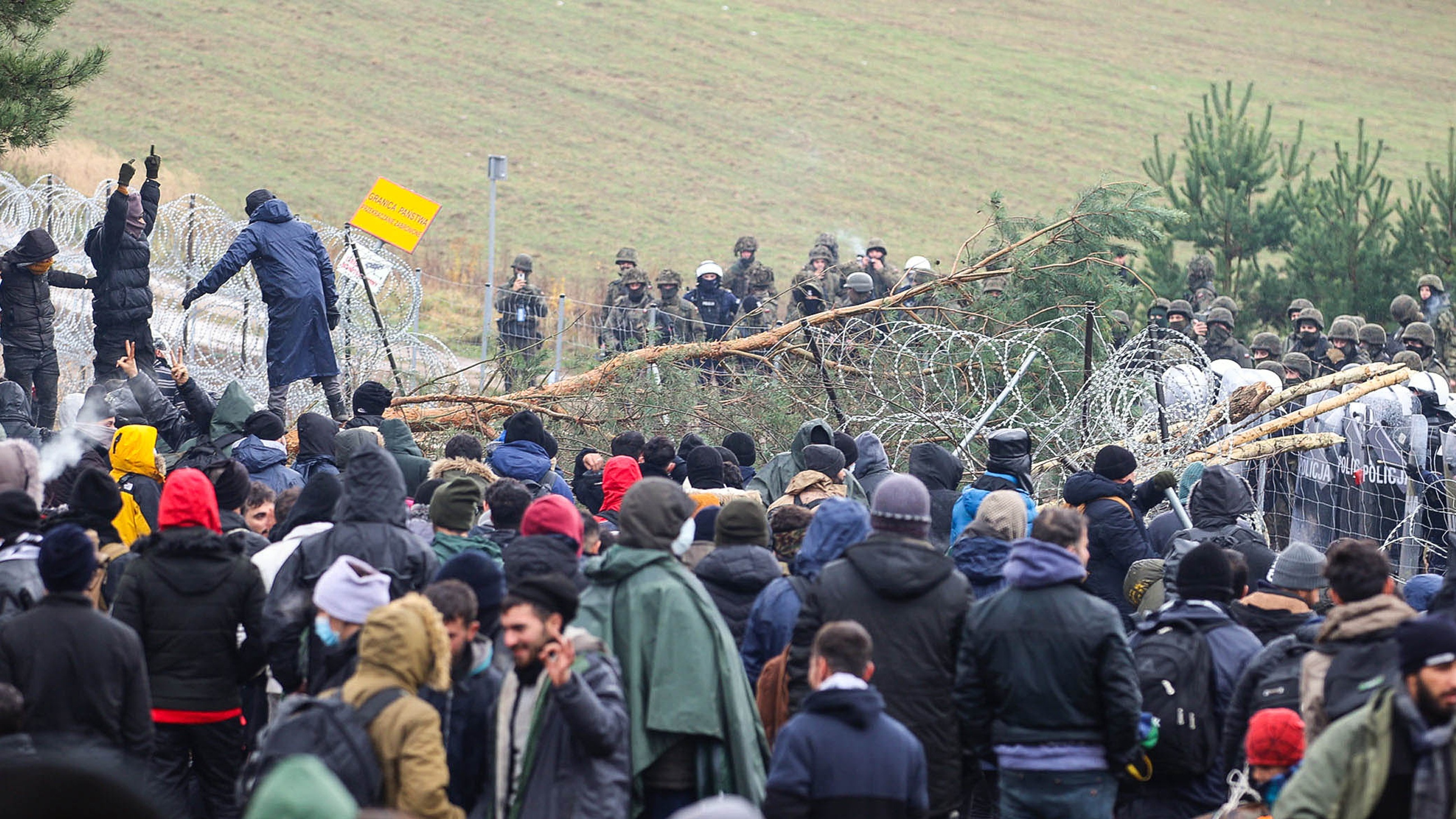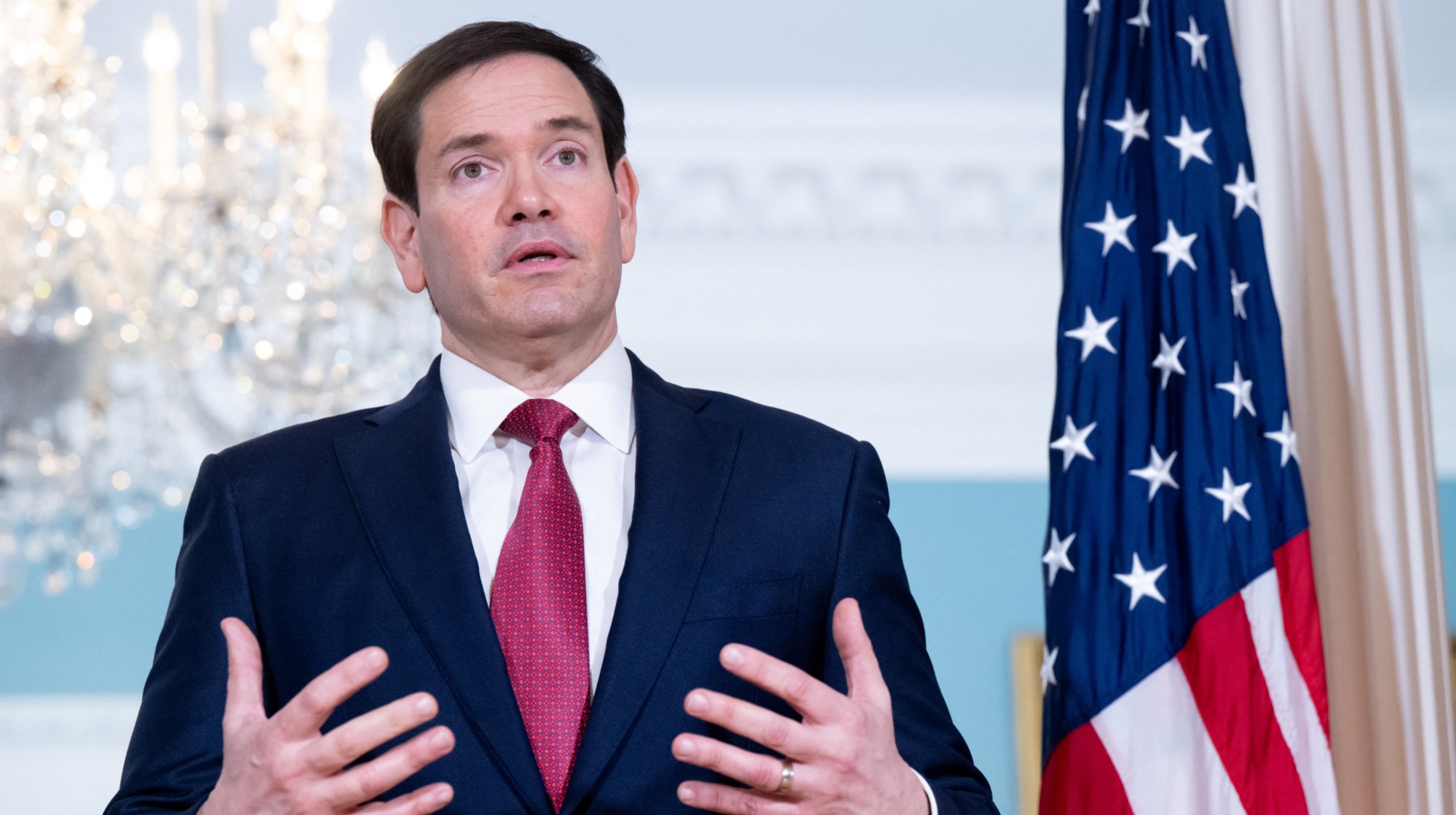What can be done to end the Belarus border crisis?
Warsaw fears escalation of armed conflict as hundreds of migrants try to enter EU

A free daily email with the biggest news stories of the day – and the best features from TheWeek.com
You are now subscribed
Your newsletter sign-up was successful
Poland has accused Belarus of a “deliberate escalation of tension” after troops were deployed to stop a crowd of migrants from cutting a barbed-wire fence on the border between the two countries.
Warsaw claims that its eastern neighbour is “trying to provoke a new refugee crisis in Europe” in response to sanctions against Belarus’s president, Alexander Lukashenko, The Guardian said. The situation has been “simmering for months”, but became worse this week after Belarusian authorities “escorted an estimated 1,000 people, most of whom are from the Middle East, to the Polish border”.
The European Commission has accused Minsk of using “people as pawns” in Lukashenko’s dispute with the bloc, warning that he must “stop putting people's lives at risk” following “a sudden surge” in migrants on the EU’s eastern border, euronews said.
The Week
Escape your echo chamber. Get the facts behind the news, plus analysis from multiple perspectives.

Sign up for The Week's Free Newsletters
From our morning news briefing to a weekly Good News Newsletter, get the best of The Week delivered directly to your inbox.
From our morning news briefing to a weekly Good News Newsletter, get the best of The Week delivered directly to your inbox.
The US and Nato have also “pointed fingers at the Lukashenko government”, the broadcaster added, with the US State Department describing the scenes at the border as “troubling” and calling on Belarus to stop its “manipulation” of the situation.
Fortress Europe
Poland, Lithuania and Latvia have seen “a surge in the number of people trying to enter their countries illegally from Belarus” for months, with most of the refugees originating from “the Middle East and Asia”, the BBC said.
Warsaw has said that Belarus is “orchestrating the problem”, a claim “denied by its disputed leader”, the broadcaster added. The Polish government has closed a major border crossing at Kuznica, with government spokesperson Piotr Muller telling reporters that up to 4,000 migrants are currently gathered across the border in Belarus.
A free daily email with the biggest news stories of the day – and the best features from TheWeek.com
Muller has warned that Lukashenko is trying to create “an escalation” of “an armed nature” amid the tense stand-off, while Stanislaw Zaryn, head of Poland’s national security department, has said the Belarusian president “wants to cause a major incident, preferably with shots fired and casualties”.
With so many refugees finding themselves “trapped between borders”, The Guardian said, “at least eight” people have reportedly died so far “due to exposure”. Most of the migrants are currently camping out in “inhospitable forests as temperatures drop below freezing”.
Videos seen by the paper show Polish border guards “spraying chemicals at men who were trying to cut the razor-wire border fence”. In other footage “gunshots were audible”. However, “it is not clear whether anyone was injured” as a result.
European Commission President Ursula von der Leyen has said the EU is considering “extending sanctions” to include “third-country airlines” that are “involved in flying migrants to Belarus”, the BBC said. Germany has also offered to help Poland “secure its borders”, the broadcaster added.
Nato, of which Poland is a member, has also warned Minsk against “using migrants as political pawns”.
‘A new low’
There is “no doubt Poland faces a legitimate emergency”, Politico said, with border guards reporting “more than 30,000 illegal attempts to cross the border since August”.
Lukashenko is clearly “trying to weaponize thousands of desperate people hungering to get into the EU as a way of punishing the bloc for the sanctions imposed on him”, the site continued. And while “the government’s tough approach to securing the border is popular”, it is raising “qualms about the humanitarian aspects”.
“Some left-wing politicians have been calling for migrants to be admitted” and “granted asylum status”, the site added. But keeping the migrants suspended in limbo outside the country is “strengthening” the Law and Justice Party’s “appeal with its core voters”.
Further complicating the situation is the looming presence of Vladimir Putin behind Lukashenko’s regime. The man dubbed “Europe’s last dictator” has few allies on the international stage, but is reliant on Moscow’s support to prop up his ailing administration.
The Russian president “has already proved himself a master of the dark arts of hybrid warfare”, said The Telegraph, and “characteristically, there is plausible deniability for the former KGB agent in his latest assault on the West”.
Lukashenko “calculates that Fortress Europe will be so horrified by this new front” that “the EU could drop the sanctions against Belarus”. But “European governments believe this change of tempo was ordered not from Minsk, but from Moscow”.
Putin “doesn’t miss an opportunity to sow discord among the member states”, the paper added. But the “use of thousands of desperate migrants to drive a wedge between the EU represents a new low for the cunning Russian president”.
Any use of violence against the migrants “risks giving Belarus a propaganda win as it attempts to portray Poland as a violator of human rights”, said The New Statesman’s Europe correspondent Ido Vock.
And with activists warning that “as winter approaches, conditions at the border will become deadlier”, Minsk has shown no signs that it plans to drop its “support of illegal migration into the EU, with potentially devastating consequences”.
Further sanctions could follow. But if they fail to break the deadlock, Belarus’s “attack on Polish sovereignty” will continue, The Telegraph said.
“Putin clearly approves of the tactic,” the paper added. And he “has shown himself willing to use every weapon at his disposal” to achieve his aims.
-
 What are the best investments for beginners?
What are the best investments for beginners?The Explainer Stocks and ETFs and bonds, oh my
-
 What to know before filing your own taxes for the first time
What to know before filing your own taxes for the first timethe explainer Tackle this financial milestone with confidence
-
 The biggest box office flops of the 21st century
The biggest box office flops of the 21st centuryin depth Unnecessary remakes and turgid, expensive CGI-fests highlight this list of these most notorious box-office losers
-
 How are Democrats turning DOJ lemons into partisan lemonade?
How are Democrats turning DOJ lemons into partisan lemonade?TODAY’S BIG QUESTION As the Trump administration continues to try — and fail — at indicting its political enemies, Democratic lawmakers have begun seizing the moment for themselves
-
 How corrupt is the UK?
How corrupt is the UK?The Explainer Decline in standards ‘risks becoming a defining feature of our political culture’ as Britain falls to lowest ever score on global index
-
 How did ‘wine moms’ become the face of anti-ICE protests?
How did ‘wine moms’ become the face of anti-ICE protests?Today’s Big Question Women lead the resistance to Trump’s deportations
-
 How are Democrats trying to reform ICE?
How are Democrats trying to reform ICE?Today’s Big Question Democratic leadership has put forth several demands for the agency
-
 Why is Tulsi Gabbard trying to relitigate the 2020 election now?
Why is Tulsi Gabbard trying to relitigate the 2020 election now?Today's Big Question Trump has never conceded his loss that year
-
 Trump’s ‘Board of Peace’ comes into confounding focus
Trump’s ‘Board of Peace’ comes into confounding focusIn the Spotlight What began as a plan to redevelop the Gaza Strip is quickly emerging as a new lever of global power for a president intent on upending the standing world order
-
 Will Democrats impeach Kristi Noem?
Will Democrats impeach Kristi Noem?Today’s Big Question Centrists, lefty activists also debate abolishing ICE
-
 White House halts migrant visas for 75 countries
White House halts migrant visas for 75 countriesSpeed Read Brazil, Egypt, Russia, Iran and Somalia are among the nations on the list